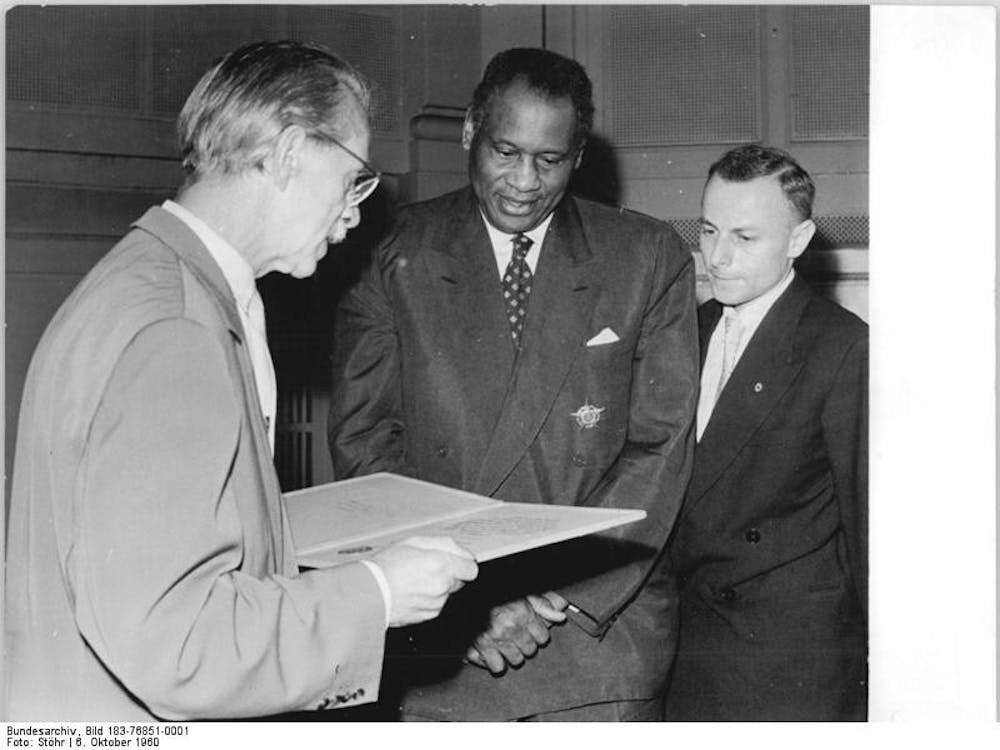In an event titled “Black Activism, Then and Now,” hosted by the Princeton Public Library on Tuesday, Feb. 15, panelists discussed the local, national, and international activism of Paul Robeson, a musician, athlete, and prominent activist for racial equality. Robeson was born in the town of Princeton and his legacy of sustained student activism at the University is still salient today.
The panel was moderated by Nyle Fort GS ’21, who received his Ph.D. in Religion and Interdisciplinary Humanities with a concentration in African American Studies, and featured Dr. Shana L. Redmond, President-Elect of the American Studies Association and a scholar of English Literature and Race at Columbia University; Meena Jagannath, Director of Global Programs at Movement Law Lab, a social justice legal organization; and Reverend Lukata Mjumbe, Pastor of the Witherspoon Street Presbyterian Church in the town of Princeton as panelists for the event.
Robeson’s multifaceted legacy was a key point in the conversation.
“Many people want to just talk about Paul Robeson and the deep baritone Old Man River and that's so important as a part of what he was,” Mjumbe stated. “But would you have really loved Paul Robeson when he was alive, when he was being burned in effigy up in upstate New York, when he was having his passport seized, when he was thinking that he had been poisoned, when he was given electroshock treatment, when when he was being attacked and vilified before the House Un-American Activities Committee?”
Redmond explained the opposition Robeson faced from the U.S. State Department during the second Red Scare of the 1940s and 50s. He was “an enemy of the state, they would not allow him to travel abroad from 1950 to 1958,” she said, after his passport was revoked after he was accused of being a Communist, which eliminated most of his income from his career as a musician.
“He was someone who was one of the petitioners and organizers for the 1951 We Charge Genocide petition that went to the United Nations,” she said. “He delivered the formable copy to the U.N. in New York City.”
Jagannath connected Robeson’s experiences to what she has seen as a lawyer, especially working with young people in Chicago in the mid-2010s amid the early years of the Black Lives Matter movement.
“The U.S. touts its reputation on the world stage as some bastion of human rights,” she said. “And meanwhile it is killing its own people, running tanks through the streets, and holding people arbitrarily off offshore, among many other abuses of its own people.”
Mjumbe talked about how Robeson’s life had moved him to take action in his community.
“Even before I became a pastor and was inspired by his father,” Mjumbe said of William Robeson, who served as the minister of the Witherspoon Street Presbyterian Church from 1880 to 1901. “Paul Robeson inspired me. Paul Robeson inspired me as an activist, as an organizer, as someone who thought locally, who worked locally but had visions that were global.”
Robeson was an active opponent of a number of policies enacted by Woodrow Wilson ’1879 during his time as University president, particularly those excluding students of color from the University.
“He demanded that one of Paul’s older brothers be able to enroll at Princeton University,” Mjumbe explained. “But the response was that we don't have colors here at Princeton University.”

This legacy of activism continues at Princeton, the panelists remarked. Fort recalled the campus atmosphere when he arrived at the University in 2014 to begin his Ph.D., in the wake of national protests after the murder of Michael Brown in Ferguson, Miss. On campus, the Black Justice League, a then newly-formed Black student activist group, had led a series of protests.
“I think it is important what you said about Paul Robeson, and that relationship between President Woodrow Wilson because the students were fighting against the naming of the [public policy] school being under Woodrow Wilson, but not always seeing ourselves in the tradition of a Paul Robeson who had already been fighting and resisting these broader structures that go back to the to the very beginning of Princeton history,” he said.
Redmond also discussed the lack of recognition for Robeson’s name and work in today’s world, telling Fort, “If I had a friend who knew his name, I would count myself lucky. Unfortunately, there are too many people who don't know his name.”
“It was a coerced forgetting, right?” she added. “It was at the hands of the State Department both in the U.S. and various other colonial nations around the world.”
Mjumbe also commented on the importance of learning about Robeson and his story. “I think in some ways, you cannot understand Princeton — you certainly can't understand Black Princeton — if you don't understand the legacy of the Robeson family,” he said.
Redmond also spoke on the legacy of activism at Princeton moving forward, specifically with regard to policing on campus.
“How do we actually abolish policing on campuses?” she asked. “These are places of education, these are places that should be welcoming and accommodating to everyone. And the police, we know, do not make us safer, they make us more vulnerable.”
Jagannath highlighted the importance of these movements.
“The manifestations of injustice that we see at the local level, they’re all interconnected, right, like the systems that are producing injustice,” she said. “You know, in Princeton, in Miami, and other places there are the same systems that are oppressing people elsewhere.”
The event was co-hosted by the Pace Center for Civic Engagement and the Paul Robeson House of Princeton, and made possible with support from the National Endowment for the Humanities. It was hosted on Zoom from 7 p.m. to 8 p.m.
Katherine Dailey is a Co-Head News Editor who often covers breaking news, politics, and University affairs. She can be reached at kdailey@princeton.edu or on Twitter at @kmdailey7.








